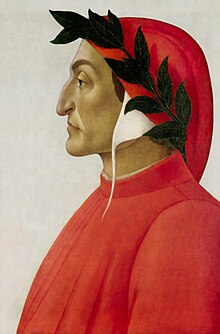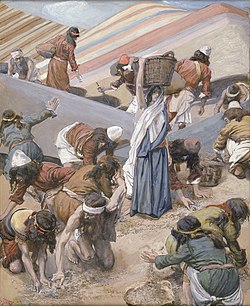2016年1月9日 星期六
English Vocabulary and Eytmology(Week17)
Ethnic group
An ethnic group or ethnicity is a category of people who identify with each other based on common ancestral, social, cultural or national experience. Unlike most other social groups, ethnicity is primarily an inherited status. Membership of an ethnic group tends to be defined by a shared cultural heritage, ancestry, origin myth, history, homeland, language and/or dialect, symbolic systems such as religion, mythology and ritual, cuisine, dressing style, art, and physical appearance.Ethnic groups, derived from the same historical founder population, often continue to speak related languages and share a similar gene pool. By way of language shift, acculturation, adoption and religious conversion, it is possible for some individuals or groups to leave one ethnic group and become part of another (except for ethnic groups emphasizing racial purity as a key membership criterion).
Ethnicity is often used synonymously with ambiguous terms such as nation or people.
Harriet Tubman
An African-American abolitionist, humanitarian, and, during the American Civil War, a Union spy. Born into slavery, Tubman escaped and subsequently made some thirteen missions to rescue approximately seventy enslaved family and friends, using the network of antislavery activists and safe houses known as the Underground Railroad. She later helped abolitionist John Brown recruit men for his raid on Harpers Ferry, and in the post-war era was an active participant in the struggle for women's suffrage.The History of English
Prefix / Root / Suffix
ab-: away fromabandon (v.) to give up; discontinue; withdraw from
example: The broken bike was found abandoned by the river side.
aboriginal (adj.) original or earliest known; native; indigenous
example: Spence is the leader of an aboriginal community called Attawapiskat in northern Ontario.
ad-: toward
adventure (n.) an exciting or very unusual experience
example: The storm madeour hike a real adventure.
adroit (adj.) cleverly skillful, resourceful, or ingenious
example: He is adroit at making excuses.
Vocabulary
henpeck (v.) to browbeat, bully, or intimidate (one's husband, boyfriend, etc.)example: My mother always henpecks my father.
checkmate (n.) an act or instance of maneuvering the opponent's king into a check from which it cannot escape, thus bringing the game to a victorious conclusion
example: His efforts to escape met with a checkmate.
English Vocabulary and Etymology(Week16)
Prefix / Root / Suffix
cardi-: heartcardinal (n.) Roman Catholic Church. a high ecclesiastic appointed by the pope to the College of Cardinals and ranking above every other ecclesiastic but the pope
example: I've had dinner with Bill and Cardinal Smith.
cardiac (adj.) of or relating to the heart
example: Mandy has a cardiac disease.
mega-: big
megalomania (n.) a symptom of mental illness marked by delusions of greatness, wealth, etc
example: The dictator was suffering from megalomania.
megastar (n.) a very well-known personality in the entertainment business
example: Jolin is a megastar in Taiwan.
post-: behind
postdate (v.) to follow in time
example: His recognition as an artist postdated his death.
postpone (v.) to put off to a later time; defer
example: People should postpone private gain to the public welfare.
trans-: across
transcend (v.) to rise above or go beyond; overpass; exceed
example: Human should always transcend their limits.
transcript (n.) a written, typewritten, or printed copy
example: A transcript of the tapes was presented as evidence in court.
nano-: extremely small
nanotechnology (n.) a technology executed on the scale of less than 100 nanometers, the goal of which is to control individual atoms and molecules
example: Nanotechnology bears a special burden.
hyper-: over / beyond
hyperactive (adj.) (of children) displaying exaggerated physical activity sometimes associated with neurologic or psychologic causes
example: He was a slow developer and hyperactive.
hypertension (n.) excessive or extreme emotional tenseness
example: Hypertension is not an unusual occurrence in the PACU.
hypo-: under
hypodermic (adj.) characterized by the introduction of medicine or drugs under the skin
example: He was frightened at seeing the hypodermic needle.
hypocrisy (n.) the practice of professing standards, beliefs, etc, contrary to one's real character or actual behaviour, esp the pretence of virtue and piety
example: I have no brow of such worldly hypocrisy.
hypochondria (n.) excessive worry or talk about one's health
example: We know the only thing more hopeless than his hypochondria is his romanticism.
ndum-: to be done
referendum (n.) the principle or practice of referring measures proposed or passed by a legislative body to the vote of the electorate for approval or rejection.
example: Many people abstained in the referendum.
memorandum (n.) a short note designating something to be remembered, especially something to be done or acted upon in the future; reminder
example: He sent us a memorandum about the meeting.
Stigma
A term used by members of the Christian faith to describe body marks, sores, or sensations of pain in locations corresponding to the crucifixion wounds of Jesus Christ, such as the hands, wrists, and feet causing extreme pain and torrid affect of humiliation. An individual bearing the wounds of Stigmata is referred to as a Stigmatist.
 >>St. Francis of assisi
>>St. Francis of assisi
An Italian Roman Catholic friar and preacher. He founded the men's Order of Friars Minor, the women’s Order of Saint Clare, the Third Order of Saint Francis and the Custody of the Holy Land. Francis is one of the most venerated religious figures in history.Pope
The Bishop of Rome and the leader of the worldwide Catholic Church. The primacy of the Roman bishop is largely derived from his role as the traditional successor to Saint Peter, to whom Jesus is supposed to have given the keys of Heaven and the powers of "binding and loosing", naming him as the "rock" upon which the church would be built. The current pope is Francis, who was elected on 13 March 2013, succeeding Benedict XVI.>>St. Peter
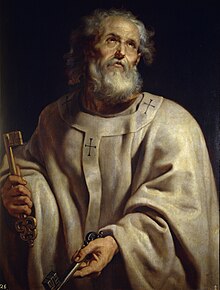 According to the New Testament, Saint Peter was one of the Twelve Apostles of Jesus Christ, leaders of the early Christian Church. The Roman Catholic Church considers him to be the first Pope, ordained by Jesus in the "Rock of My Church" dialogue in Matthew 16:18. The ancient Christian churches all venerate Peter as a major saint and associate him with founding the Church of Antioch and later the Church in Rome, but differ about the authority of his various successors in present-day Christianity.
According to the New Testament, Saint Peter was one of the Twelve Apostles of Jesus Christ, leaders of the early Christian Church. The Roman Catholic Church considers him to be the first Pope, ordained by Jesus in the "Rock of My Church" dialogue in Matthew 16:18. The ancient Christian churches all venerate Peter as a major saint and associate him with founding the Church of Antioch and later the Church in Rome, but differ about the authority of his various successors in present-day Christianity.Key of Heaven
In the Gospel of Matthew 16:19, Jesus says to Peter, "I will give you the keys of the kingdom of heaven, and whatever you bind on earth shall be bound in heaven, and whatever you loose on earth shall be loosed in heaven.">>Pope Benedict XVI
 Pope of the Catholic Church from 2005 until his resignation in 2013. On 11 February 2013, Benedict announced his resignation in a speech in Latin before the cardinals, citing a "lack of strength of mind and body" due to his advanced age. His resignation became effective on 28 February 2013. He is the first pope to resign since Pope Gregory XII in 1415, and the first to do so on his own initiative since Pope Celestine V in 1294. As pope emeritus, Benedict retains the style of His Holiness, and the title of Pope, and continues to dress in the papal color of white. He was succeeded by Pope Francis on 13 March 2013, and he moved into the newly renovated Mater Ecclesiae monastery for his retirement on 2 May 2013.
Pope of the Catholic Church from 2005 until his resignation in 2013. On 11 February 2013, Benedict announced his resignation in a speech in Latin before the cardinals, citing a "lack of strength of mind and body" due to his advanced age. His resignation became effective on 28 February 2013. He is the first pope to resign since Pope Gregory XII in 1415, and the first to do so on his own initiative since Pope Celestine V in 1294. As pope emeritus, Benedict retains the style of His Holiness, and the title of Pope, and continues to dress in the papal color of white. He was succeeded by Pope Francis on 13 March 2013, and he moved into the newly renovated Mater Ecclesiae monastery for his retirement on 2 May 2013.
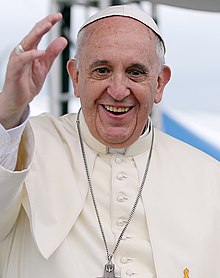 >>Pope Francis
>>Pope Francis
The 266th and current Pope of the Roman Catholic Church. Following the resignation of Pope Benedict XVI on 28 February 2013. He chose Francis as his papal name in honor of Saint Francis of Assisi. Throughout his public life, Pope Francis has been noted for his humility, emphasis on God's mercy, concern for the poor, and commitment to interfaith dialogue. He is credited with having a humble, less formal approach to the papacy than his predecessors, for instance choosing to reside in the Domus Sanctae Marthae guesthouse rather than in the papal apartments of the Apostolic Palace used by his predecessors. Stephen Crane
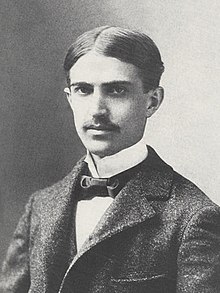 Stephen Crane (November 1, 1871 – June 5, 1900) was an American poet, novelist, and short story writer. Prolific throughout his short life, he wrote notable works in the Realist tradition as well as early examples of American Naturalism and Impressionism. He is recognized by modern critics as one of the most innovative writers of his generation.
Stephen Crane (November 1, 1871 – June 5, 1900) was an American poet, novelist, and short story writer. Prolific throughout his short life, he wrote notable works in the Realist tradition as well as early examples of American Naturalism and Impressionism. He is recognized by modern critics as one of the most innovative writers of his generation.The ninth surviving child of Protestant Methodist parents, Crane began writing at the age of four and had published several articles by the age of 16. Having little interest in university studies, he left college in 1891 to work as a reporter and writer. Crane's first novel was the 1893 Bowery tale Maggie: A Girl of the Streets, generally considered by critics to be the first work of American literary Naturalism. He won international acclaim in 1895 for his Civil War novel The Red Badge of Courage, which he wrote without having any battle experience.
The Red Badge of Courage is a war novel by American author Stephen Crane (1871–1900). Taking place during the American Civil War, the story is about a young private of the Union Army, Henry Fleming, who flees from the field of battle. Overcome with shame, he longs for a wound, a "red badge of courage," to counteract his cowardice. When his regiment once again faces the enemy, Henry acts as standard-bearer.
Western Literature(Week17)
Samon Agonistes
Samson Agonistes is a tragic closet drama by John Milton. It appeared with the publication of Milton's Paradise Regain'd in 1671.Samson Agonistes draws on the story of Samson from the Old Testament, Judges 13–16; in fact it is a dramatisation of the story starting at Judges 16:23. The drama starts in medias res.The story of Samson in Judges 13–16 portrays a man who was given great strength by God but who ultimately loses his strength when Delilah allows the Philistines to shave his hair during his slumber (Judges 16:19).
 Samson fell in love with a woman named Delilah, who lived in the valley of Sorek. The Philistine chiefs called on her, wanting her to coax from him the secret of his great strength, and how he might be captured and bound. "If you do this for us, we'll each give you eleven hundred silver shekels."
Samson fell in love with a woman named Delilah, who lived in the valley of Sorek. The Philistine chiefs called on her, wanting her to coax from him the secret of his great strength, and how he might be captured and bound. "If you do this for us, we'll each give you eleven hundred silver shekels." So she asked Samson: "Tell me where your great strength comes from - what it would take to bind you and make you captive." He replied: "If I were tied up with seven new bowstrings I'd lose my strength and be like any other man." The Philistines brought her the bowstrings and she tied him up with them. She had men hidden in another room, and she called out: "The Philistines have come for you, Samson!" He snapped the bowstrings just as a thread breaks when fire touches it. So they remained ignorant of the secret of his strength. She said to him, "Look, you're playing games with me, you're lying to me. Now tell me how you can be tied up." So he told her, "If they bind me with new ropes that have never been used, I'll be as helpless as anybody else." So Delilah tied him with new ropes. Then she called out: "The Philistines have come for you, Samson!" And the men were lying in wait in the other room. But he snapped the ropes off his arms like thread. Delilah said to Samson, "You are still making fun of me, telling me lies. Tell me how you can be bound!" "Well," he said, "if you weave my seven locks of hair into a loom, and fasten them with a peg, I'll be as weak as other men." She soothed him to sleep, took his locks of hair and wove them into the loom, and then shouted: "The Philistines have come for you, Samson!" But he woke up and pulled his hair loose. Delilah said to him, "How can you say you love me when you obviously don't trust me? Three times now you have you have made a fool of me!" She kept on at him day after day. He got so sick of her nagging that in the end he told her the truth: "No razor has ever touched my head, because I have been a Nazirite, dedicated to God from birth. If my head were shaved my strength would leave me and I would be no different from others." Delilah realised that this time he had told her the truth. She summoned the Philistines one more time. They came bringing the money. She lulled Samson to sleep in her lap, and called in a man to cut off his seven locks of hair - and his strength left him. Then she called out: "The Philistines have come for you, Samson!" He awoke from sleep, imagining he could get loose and escape as always before. He did not realise that Yahweh had turned away from him. The Philistines seized him, gouged out his eyes, and took him down to Gaza. They shackled him with bronze chains, and put him to work turning the mill in the prison. But the hair that had been shorn off began to grow again.
* Fatal Woman:Delilah
A femme fatale is a stock character of a mysterious and seductive woman whose charms ensnare her lovers, often leading them into compromising, dangerous, and deadly situations.Delilah is a character in the Hebrew bible Book of Judges, where she is the "woman in the valley of Sorek" whom Samson loved, and who was his downfall.
John Milton
John Milton (9 December 1608 – 8 November 1674) was an English poet, polemicist, man of letters, and a civil servant for the Commonwealth of England under Oliver Cromwell. He wrote at a time of religious flux and political upheaval, and is best known for his epic poem Paradise Lost (1667), written in blank verse.Milton's poetry and prose reflect deep personal convictions, a passion for freedom and self-determination, and the urgent issues and political turbulence of his day.
Paradise Lost
 Paradise Lost is an epic poem in blank verse by the 17th-century English poet John Milton (1608–1674). The first version, published in 1667, consisted of ten books with over ten thousand lines of verse.
Paradise Lost is an epic poem in blank verse by the 17th-century English poet John Milton (1608–1674). The first version, published in 1667, consisted of ten books with over ten thousand lines of verse.The poem concerns the Biblical story of the Fall of Man: the temptation of Adam and Eve by the fallen angel Satan and their expulsion from the Garden of Eden. Milton's purpose, stated in Book I, is to "justify the ways of God to men".
Satan is a figure appearing in the texts of the Abrahamic religions who brings evil and temptation, and is known as the deceiver who leads humanity astray. Some religious groups teach that he originated as an angel who fell out of favor with God, seducing humanity into the ways of sin, and who has power in the fallen world. In the Hebrew Bible and the New Testament, Satan is primarily an accuser and adversary, a decidedly malevolent entity, also called the devil, who possesses demonic qualities.
Lucifer has become a by-word for Satan/the Devil in the church and in popular literature", as in Dante Alighieri's Inferno and John Milton's Paradise Lost.
Prince of Darkness is a term used in John Milton's poem Paradise Lost referring to Satan as the embodiment of evil. It is an English translation of the Latin phrase princeps tenebrarum.
Dante Alighieri
A major Italian poet of the late Middle Ages. His Divine Comedy, originally called Comedìa (modern Italian: Commedia) and later christened Divina by Boccaccio, is widely considered the greatest literary work composed in the Italian language and a masterpiece of world literature.Divine Comedy
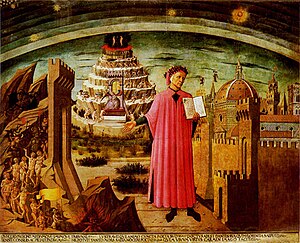 An epic poem by Dante Alighieri, begun c. 1308 and completed 1320, a year before his death in 1321. It is widely considered the preeminent work of Italian literature and is seen as one of the greatest works of world literature. The poem's imaginative vision of the afterlife is representative of the medieval world-view as it had developed in the Western Church by the 14th century. It helped establish the Tuscan language, in which it is written, as the standardized Italian language. It is divided into three parts: Inferno, Purgatorio, and Paradiso.
An epic poem by Dante Alighieri, begun c. 1308 and completed 1320, a year before his death in 1321. It is widely considered the preeminent work of Italian literature and is seen as one of the greatest works of world literature. The poem's imaginative vision of the afterlife is representative of the medieval world-view as it had developed in the Western Church by the 14th century. It helped establish the Tuscan language, in which it is written, as the standardized Italian language. It is divided into three parts: Inferno, Purgatorio, and Paradiso.On the surface, the poem describes Dante's travels through Hell, Purgatory, and Paradise or Heaven but at a deeper level, it represents, allegorically, the soul's journey towards God. At this deeper level, Dante draws on medieval Christian theology and philosophy, especially Thomistic philosophy and the Summa Theologica of Thomas Aquinas. Consequently, the Divine Comedy has been called "the Summa in verse".
>>Inferno
Inferno is the first part of Divine Comedy. It is an allegory telling of the journey of Dante through Hell, guided by the Roman poet Virgil. In the Divine Comedy, Inferno describes the recognition and rejection of sin. The poem starts on Maundy Thursday in the year 1300. The narrator, Dante himself, is thirty-five years old, and thus "halfway along our life's path" – half of the Biblical lifespan of seventy The poet finds himself lost in a dark wood in front of a mountain, assailed by three beasts (a lion, a lonza, and a she-wolf) he cannot evade. Unable to find the "straight way" ( also translatable as "right way") to salvation, he is conscious that he is ruining himself and falling into a "deep place" where the sun is silent .
The poem starts on Maundy Thursday in the year 1300. The narrator, Dante himself, is thirty-five years old, and thus "halfway along our life's path" – half of the Biblical lifespan of seventy The poet finds himself lost in a dark wood in front of a mountain, assailed by three beasts (a lion, a lonza, and a she-wolf) he cannot evade. Unable to find the "straight way" ( also translatable as "right way") to salvation, he is conscious that he is ruining himself and falling into a "deep place" where the sun is silent .Dante is at last rescued by the Roman poet Virgil, who claims to have been sent by Beatrice, and the two of them begin their journey to the underworld. Each sin's punishment in Inferno is a contrapasso, a symbolic instance of poetic justice; for example, fortune-tellers have to walk forward with their heads on backward, unable to see what is ahead, because they tried to see the future through forbidden means. Such a contrapasso "functions not merely as a form of divine revenge, but rather as the fulfilment of a destiny freely chosen by each soul during his or her life."
Dante passes through the gate of Hell, which bears an inscription ending with the famous phrase "Lasciate ogne speranza, voi ch'intrate", most frequently translated as "Abandon all hope, ye who enter here."
Dan Brown
Inferno is a 2013 mystery thriller novel by American author Dan Brown and the fourth book in his Robert Langdon series.
The New York Times praised the book as being "jampacked with tricks" and said that Langdon is on "one of those book-length scavenger hunts that Mr. Brown creates so energetically." The New York Daily News reviewed the book favorably, calling it a book of "harrowing fun threaded with coded messages, art history, science, and imminent doom."
>>Purgatorio
 Purgatorio is the second part of Dante's Divine Comedy. The poem was written in the early 14th century. It is an allegory telling of the climb of Dante up the Mount of Purgatory, guided by the Roman poet Virgil, except for the last four cantos at which point Beatrice takes over as Dante's guide. In the poem, Purgatory is depicted as a mountain in the Southern Hemisphere, consisting of a bottom section (Ante-Purgatory), seven levels of suffering and spiritual growth (associated with the seven deadly sins), and finally the Earthly Paradise at the top. Allegorically, the poem represents the Christian life, and in describing the climb Dante discusses the nature of sin, examples of vice and virtue, as well as moral issues in politics and in the Church. The poem outlines a theory that all sin arises from love – either perverted love directed towards others' harm, or deficient love, or the disordered or excessive love of good things.
Purgatorio is the second part of Dante's Divine Comedy. The poem was written in the early 14th century. It is an allegory telling of the climb of Dante up the Mount of Purgatory, guided by the Roman poet Virgil, except for the last four cantos at which point Beatrice takes over as Dante's guide. In the poem, Purgatory is depicted as a mountain in the Southern Hemisphere, consisting of a bottom section (Ante-Purgatory), seven levels of suffering and spiritual growth (associated with the seven deadly sins), and finally the Earthly Paradise at the top. Allegorically, the poem represents the Christian life, and in describing the climb Dante discusses the nature of sin, examples of vice and virtue, as well as moral issues in politics and in the Church. The poem outlines a theory that all sin arises from love – either perverted love directed towards others' harm, or deficient love, or the disordered or excessive love of good things.* Seven deadly sin
A Western religious grouping and classification of vices. The sins have fluctuated over time, the currently recognized list includes pride, greed, lust, envy, gluttony, wrath and sloth. There is a parallel tradition of seven virtues.
>>Paradiso
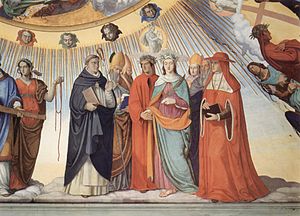 Paradiso is the third and final part of Dante's Divine Comedy. It is an allegory telling of Dante's journey through Heaven, guided by Beatrice, who symbolises theology. In the poem, Paradise is depicted as a series of concentric spheres surrounding the Earth, consisting of the Moon, Mercury, Venus, the Sun, Mars, Jupiter, Saturn, the Fixed Stars, the Primum Mobile and finally, the Empyrean. It was written in the early 14th century. Allegorically, the poem represents the soul's ascent to God.
Paradiso is the third and final part of Dante's Divine Comedy. It is an allegory telling of Dante's journey through Heaven, guided by Beatrice, who symbolises theology. In the poem, Paradise is depicted as a series of concentric spheres surrounding the Earth, consisting of the Moon, Mercury, Venus, the Sun, Mars, Jupiter, Saturn, the Fixed Stars, the Primum Mobile and finally, the Empyrean. It was written in the early 14th century. Allegorically, the poem represents the soul's ascent to God.Book of Exodus
Moses
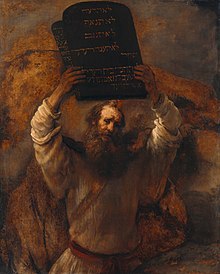 Moses was born in a time when his people, the Israelites, an enslaved minority, were increasing in numbers and the Egyptian Pharaoh was worried that they might ally with Egypt's enemies. Moses' Hebrew mother, Jochebed, secretly hid him when the Pharaoh ordered all newborn Hebrew boys to be killed in order to reduce the population of the Israelites. Through the Pharaoh's daughter (identified as Queen Bithia in the Midrash), the child was adopted as a foundling from the Nile river and grew up with the Egyptian royal family. After killing an Egyptian slavemaster (because the slavemaster was smiting a Hebrew), Moses fled across the Red Sea to Midian, where he encountered the God of Israel speaking to him from within a "burning bush which was not consumed by the fire" on Mount Horeb (which he regarded as the Mountain of God).
Moses was born in a time when his people, the Israelites, an enslaved minority, were increasing in numbers and the Egyptian Pharaoh was worried that they might ally with Egypt's enemies. Moses' Hebrew mother, Jochebed, secretly hid him when the Pharaoh ordered all newborn Hebrew boys to be killed in order to reduce the population of the Israelites. Through the Pharaoh's daughter (identified as Queen Bithia in the Midrash), the child was adopted as a foundling from the Nile river and grew up with the Egyptian royal family. After killing an Egyptian slavemaster (because the slavemaster was smiting a Hebrew), Moses fled across the Red Sea to Midian, where he encountered the God of Israel speaking to him from within a "burning bush which was not consumed by the fire" on Mount Horeb (which he regarded as the Mountain of God).God sent Moses back to Egypt to demand the release of the Israelites from slavery. Moses said that he could not speak with assurance or eloquence, so God allowed Aaron, his brother, to become his spokesperson. After the Ten Plagues, Moses led the Exodus of the Israelites out of Egypt and across the Red Sea, after which they based themselves at Mount Sinai, where Moses received the Ten Commandments. After 40 years of wandering in the desert, Moses died within sight of the Promised Land.
Burning bush
 The burning bush is an object described by the Book of Exodus as being located on Mount Horeb. According to the narrative, the bush was on fire, but was not consumed by the flames, hence the name.
The burning bush is an object described by the Book of Exodus as being located on Mount Horeb. According to the narrative, the bush was on fire, but was not consumed by the flames, hence the name.In the biblical narrative, the burning bush is the location at which Moses was appointed by Yahweh (God) to lead the Israelites out of Egypt and into Canaan.
The Hebrew word used in the narrative, that is translated into English as bush, is seneh, which refers in particular to brambles; seneh is a biblical dis legomenon, only appearing in two places, both of which describe the burning bush. It is possible that the reference to a burning bush is based on a mistaken interpretation of Sinai , a mountain described by the Bible as being on fire. Another possibility is that the use of seneh may be a deliberate pun on Sinai , a feature common in Yahwistic texts.
In the narrative, an angel of the Lord is described as appearing in the bush, and God is subsequently described as calling out from it to Moses, who had been grazing Jethro's flocks there. When Moses starts to approach, God tells Moses to take off his sandals first, due to the place being holy ground, and Moses hides his face.
Plagues of Egypt
The first three plagues seemed to affect "all the land of Egypt", while the 4th, 5th, 6th, 7th, and 9th did not affect the children of Israel. Conditions of the 8th plague are unclear. For the last plague, the Torah indicates that they were only spared from the final plague by sacrificing the Paschal lamb, marking their place directly above their doors with the lamb's blood, and eating the roasted sacrifice together with Matzot in a celebratory feast. The Torah describes God as actually passing through Egypt to kill all firstborn children and cattle, but passing over (hence "Passover") houses which have the sign of lambs' blood on the doorpost. It is debated whether it was actually God who came through the streets or one of his angels. Some also think it may be the Holy Spirit. It is most commonly known as the "Angel of Death". The night of this plague, Pharaoh finally relents and sends the Israelites away under their terms.
Manna
An edible substance that, according to the Bible and the Qura, God provided for the Israelites during their travels in the desert.In the Hebrew Bible, manna is described twice: once in Exodus 16:1-36 with the full narrative surrounding it, and once again in Numbers 11:1-9as a part of a separate narrative.In the description in the Book of Exodus, manna is described as being "a fine, flake-like thing" like the frost on the ground. Exodus adds that manna was comparable to hoarfrost in size, similarly had to be collected before it was melted by the heat of the sun, and was white like coriander seed.
Passover
An important, biblically derived Jewish festival. The Jewish people celebrate Passover as a commemoration of their liberation by God from slavery in Egypt and their freedom as a nation under the leadership of Moses. It commemorates the story of the Exodus as described in the Hebrew Bible especially in the Book of Exodus, in which the Israelites were freed from slavery in Egypt. According to standard biblical chronology, this event would have taken place at about 1300 BCETen Commandment
The Ten Commandments, also known as the Decalogue, are a set of commandments which the Bible describes as having been given to the Israelites by God at biblical Mount Sinai. The Ten Commandments are listed twice in the Hebrew Bible, first at Exodus 20:1–17, and then at Deuteronomy 5:4–21. Both versions state that God inscribed them on two stone tablets, which he gave to Moses. According to New Testament writers, the Ten Commandments are clearly attributed to Moses (Mark 7:10, see also John 7:19).Modern scholarship has found likely influences in Hittite and Mesopotamian laws and treaties, but is divided over exactly when the Ten Commandments were written and who wrote them.
The commandments include instructions to worship only God, to honour parents, and to keep the sabbath; as well as prohibitions against idolatry, blasphemy, murder, adultery, theft, dishonesty, and coveting. Different religious groups follow different traditions for interpreting and numbering them.
Allegory / Fable / Parable
Allegory
As a literary device, an allegory in its most general sense is an extended metaphor.Writers or speakers typically use allegories as literary devices or as rhetorical devices that convey hidden meanings through symbolic figures, actions, imagery, and/or events, which together create the moral, spiritual, or political meaning the author wishes to convey.
One of the best-known examples of allegory, Plato's Allegory of the Cave, forms a part of his larger work The Republic.
Fable
A literary genre: a succinct fictional story, in prose or verse, that features animals, mythical creatures, plants, inanimate objects, or forces of nature that are anthropomorphized (given human qualities, such as verbal communication) and that illustrates or leads to an interpretation of a moral lesson (a "moral"), which may at the end be added explicitly as a pithy maxim.
Parable
A succinct, didactic story, in prose or verse, which illustrates one or more instructive lessons or principles. It differs from a fable in that fables employ animals, plants, inanimate objects, or forces of nature as characters, whereas parables have human characters. A parable is a type of analogy.
para-: side by side
parallel (v.) be equivalent to
example: They parallel with one another.
paragraph (n.) a distinct portion of written or printed matter dealing with a particular idea, usually beginning with an indentation on a new line
example: Don't omit this paragraph when you write your report.
parasol (n.) a lightweight umbrella used, especially by women, as a sunshade
example: Cindy bought a pretty parasol for me.
parachute (n.) a folding, umbrellalike, fabric device with cords supporting a harness or straps for allowing a person, object, package, etc., to float down safely through the air from a great height
example: When his parachute failed he thought he was a goner.
2016年1月7日 星期四
Western Literature(Week16)
The New Testament
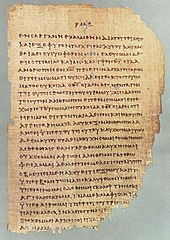 The second major part of the Christian biblical canon, the first part being the Old Testament, based on the Hebrew Bible. The Greek New Testament discusses the teachings and person of Jesus, as well as events in first-century Christianity. Christians regard both the Old and New Testaments together as sacred scripture. The New Testament (in whole or in part) has frequently accompanied the spread of Christianity around the world. It reflects and serves as a source for Christian theology and morality. Both extended readings and phrases directly from the New Testament are also incorporated (along with readings from the Old Testament) into the various Christian liturgies. The New Testament has influenced religious, philosophical, and political movements in Christendom, and left an indelible mark on literature, art, and music.
The second major part of the Christian biblical canon, the first part being the Old Testament, based on the Hebrew Bible. The Greek New Testament discusses the teachings and person of Jesus, as well as events in first-century Christianity. Christians regard both the Old and New Testaments together as sacred scripture. The New Testament (in whole or in part) has frequently accompanied the spread of Christianity around the world. It reflects and serves as a source for Christian theology and morality. Both extended readings and phrases directly from the New Testament are also incorporated (along with readings from the Old Testament) into the various Christian liturgies. The New Testament has influenced religious, philosophical, and political movements in Christendom, and left an indelible mark on literature, art, and music.The New Testament is an anthology, a collection of Christian works written in the common Greek language of the first century, at different times by various writers, who were early Jewish disciples of Jesus. In almost all Christian traditions today, the New Testament consists of 37 books.
Book Discussion
P.178Bible: Psalm 23
Ex-President George W. Bush's Post 9/11 Speech
Protestantism
Protestantism is a form of Christian faith and practice which originated with the Protestant Reformation, a movement against what its followers considered to be errors in the Roman Catholic Church. It is one of the three major divisions of Christendom, together with Roman Catholicism and Eastern Orthodoxy. Anglicanism is sometimes considered to be independent from Protestantism. The term derives from the letter of protestation from Lutheran princes in 1529 against an edict condemning the teachings of Martin Luther as heretical.Catholicism
Catholicism and its adjectival form Catholic are used as broad terms for describing specific traditions in the Christian churches in theology, doctrine, liturgy, ethics, and spirituality."Catholicism" and "Catholic" in this sense refer to the practices of several Christian churches. This sense is to be distinguished from the use of these words to refer to the Roman Catholic Church, that which is in full communion with the Holy See, as well as the Orthodox Catholic Church (commonly called the "Orthodox Church" or the "Eastern Orthodox Church"), which also considers itself the universal and apostolic church.
In the sense of indicating historical continuity of faith and practice from the first millennium, the term "catholic" is employed by many other historic churches which claim to be "heirs of the apostolic faith". These consider themselves to be catholic, teaching that the term "designates the historic, orthodox mainstream of Christianity whose doctrine was defined by the ecumenical councils and creeds" and as such, most Reformers "appealed to this catholic tradition and believed they were in continuity with it."
WASP = White Anglo-Saxon Protestant
White Anglo-Saxon Protestant (WASP) is an informal, sometimes disparaging term for a group of high-status and influential White Americans of English Protestant ancestry. The term applies to a group believed to control disproportionate social, political, and financial power in the United States. It describes a group whose family wealth, education, status, and elite connections allow them a degree of opportunity held by few others.Scholars agree that the group's influence has waned since the end of World War II, with the growing influence of other ethnic groups in the United States. The term is also used in Canada and Australia for similar elites. The term is occasionally used by sociologists to include all Americans of North European ancestry regardless of their class or power. People rarely call themselves WASPs, except humorously. The acronym is typically used by non-WASPs.
King James Bible
 An English translation of the Christian Bible for the Church of England that begun in 1604 and completed in 1611.
An English translation of the Christian Bible for the Church of England that begun in 1604 and completed in 1611.First printed by the King's Printer Robert Barker, this was the third translation into English to be approved by the English Church authorities. The first was the Great Bible commissioned in the reign of King Henry VIII (1535), and the second was the Bishops' Bible of 1568. In January 1604, James I convened the Hampton Court Conference where a new English version was conceived in response to the perceived problems of the earlier translations as detected by the Puritans, a faction within the Church of England. The translation is widely considered a towering achievement in English literature, as both beautiful and scholarly.
James gave the translators instructions intended to guarantee that the new version would conform to the ecclesiology and reflect the episcopal structure of the Church of England and its belief in an ordained clergy. The translation was done by 47 scholars, all of whom were members of the Church of England. In common with most other translations of the period, the New Testament was translated from Greek, the Old Testament was translated from Hebrew and Aramaic text, while the Apocrypha was translated from the Greek and Latin. In the Book of Common Prayer (1662), the text of the Authorized Version replaced the text of the Great Bible – for Epistle and Gospel readings (but not for the Psalter which has retained substantially Coverdale's Great Bible version) and as such was authorized by Act of Parliament.
Sodom and Gomorrah
Sodom and Gomorrah were cities mentioned in the Book of Genesis and throughout the Hebrew Bible, the New Testament and in the deuterocanonical Book of Wisdom, as well as in the Qur'an and hadith.According to the Torah, the kingdoms of Sodom and Gomorrah were allied with the cities of Admah, Zeboim and Bela. These five cities, also known as the "cities of the plain", were situated on the Jordan River plain in the southern region of the land of Canaan.
P.117~121
Genesis 1-4 [From Creation to the Murder of Abel]
Cain and Abel
 Adam knew his wife Eve intimately, and she conceived and bore Cain. She said, "I have had a male child with the Lord's help."
Adam knew his wife Eve intimately, and she conceived and bore Cain. She said, "I have had a male child with the Lord's help."Then she also gave birth to his brother Abel. Now Abel became a shepherd of a flock, but Cain cultivated the land. 3In the course of time Cain presented some of the land's produce as an offering to the Lord. 4And Abel also presented [an offering] – some of the firstborn of his flock and their fat portions. The Lord had regard for Abel and his offering, 5but He did not have regard for Cain and his offering. Cain was furious, and he was downcast.
6Then the Lord said to Cain, "Why are you furious? And why are you downcast? 7If you do right, won't you be accepted? But if you do not do right, sin is crouching at the door. Its desire is for you, but you must master it."
8Cain said to his brother Abel, "Let's go out to the field."
And while they were in the field, Cain attacked his brother Abel and killed him.
— Genesis 4:1–8 (Holman Christian Standard Bible)
The Septuagint, an early Greek translation of the Hebrew Bible, offers an alternative version of the seventh verse:If you offer properly, but divide improperly, have you not sinned? Be still; to you shall he submit, and you shall rule over him.Later in the narrative, God asks Cain, "Where is Abel thy brother?" Cain replies, "I know not: am I my brother's keeper?"
And he said, "What hast thou done? the voice of thy brother's blood crieth unto me from the ground. And now [art] thou cursed from the earth, which hath opened her mouth to receive thy brother's blood from thy hand; When thou tillest the ground, it shall not henceforth yield unto thee her strength; a fugitive and a vagabond shalt thou be in the earth." (Genesis 4:10–12)P. 122~125
Genesis 6-9 [Noah and the Flood]
 God makes a pledge of commitment to Noah in Genesis 9:1–17. The priestly (Elohim) version takes the form of a covenant arrangement. This is the first explicit act of a covenant in the Hebrew Bible and is used seven times in this episode. God commits to continue both human and animal life and vows to never again use a deluge against humanity. The covenant is sealed with the sign of a rainbow, after a storm, as a reminder.
God makes a pledge of commitment to Noah in Genesis 9:1–17. The priestly (Elohim) version takes the form of a covenant arrangement. This is the first explicit act of a covenant in the Hebrew Bible and is used seven times in this episode. God commits to continue both human and animal life and vows to never again use a deluge against humanity. The covenant is sealed with the sign of a rainbow, after a storm, as a reminder.God blesses Noah and his sons using the same language as the priestly source of the Genesis creation narrative: "Be fruitful and increase and fill the earth." Before the flood, animals and humans coexisted in a realm of peace only knowing a vegetarian diet. After the flood, God maintained that mankind would be in charge over the animals, granting that they may be eaten for food under the condition that their blood be removed. God set these purity rules well before any transaction with Ancient Israel, effectively not confining such precedence solely to the Jewish faith. Human life receives special divine sanction because humanity is in the image of Elohim.
Raven(Omen) and Dove(Peace)
P. 126
The Tower of Bible
The Tower of Babel is an etiological myth in the Book of Genesis of the Tanakh (also referred to as the Hebrew Bible or the Old Testament) meant to explain the origin of different languages. According to the story, a united humanity of the generations following the Great Flood, speaking a single language and migrating from the east, came to the land of Shinar. There they agreed to build a city and tower; seeing this, God confounded their speech so that they could no longer understand each other and scattered them around the world.
訂閱:
意見 (Atom)


